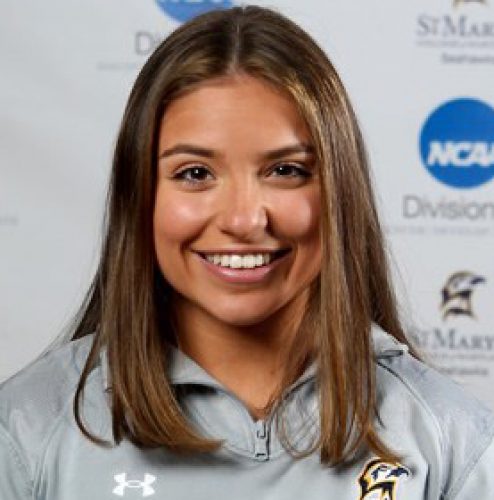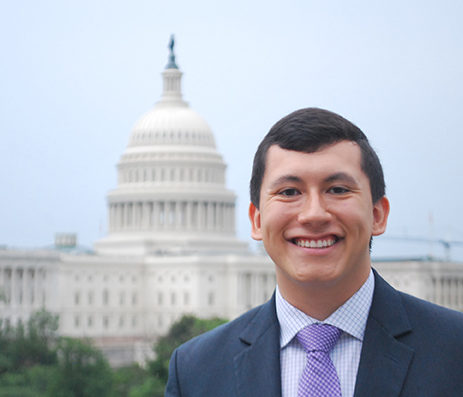Recent Winners
2022-2023 Winning Team
 The winning essay, US Retirement Policy: Personalizing Retirement Security, was authored by team leader Benjamin Ault, who was joined by team member Hans-Jacob Larsen Nesheim.
The winning essay, US Retirement Policy: Personalizing Retirement Security, was authored by team leader Benjamin Ault, who was joined by team member Hans-Jacob Larsen Nesheim.
The faculty advisor to the team was Douglas Lamdin, of the University of Maryland, Baltimore County.
Benjamin is a rising senior studying Financial Economics and Accounting at UMBC. He is from Catonsville, MD. Benjamin is also involved in coaching high school baseball, playing club ultimate at UMBC, and volunteering in Christian ministry.
Hans-Jacob is an international student-athlete from Haugesund, Norway, majoring in Financial Economics. He represents UMBC mens soccer in D1 as a defender. In his free-time he enjoys especially skiing and winter activities.


2021-2022 Winning Team





The St. Mary’s College of Maryland (SMCM) Team
Mary Claire Basso-Luca of Olney, MD is a Senior with a major in Psychology and a minor in French. She is the Vice President of the Catholic Seahawks Club and a member of the Psi Chi honor society. In her free time, she likes to knit and to read!
Jazlyn Benitez of Silver Spring, Maryland is a Senior pursuing a double major in Economics and Environmental Studies. She is an Alpha Chi Omega Student-Athlete and Captain of the SMCM Women’s swim team. She is passionate about pursuing a career advancing environmentally resilient practices in the business sector.
Peter Fortescue is a Senior and Economics Major. He is a member of Omicron Delta Epsilon International Economics Honor Society. He is a United States Coast Guard Veteran.
Rachael Freeman of Baltimore, Maryland is a Junior pursuing a double major in Economics and Public Policy with a minor in Business Management. Rachael is a member of the Omicron Delta Epsilon Economics Honor Society and a member of the Women’s Lacrosse team. Rachael hopes to pursue law school after graduating.
Kiya Rodriguez is a 2022 graduate, with a B.A. in Economics. She is planning a career in the field of data analysis.

Read the essay and the Press Release.
St. Mary’s College of Maryland Faculty Advisors
Josh Kaisen, Visiting Assistant Professor of Economics
Jennifer J. Tickle, Associate Professor of Psychology
2021-2022 Runners Up
Abrielle Manning and Jack Lunden, Rollins College
Honorable Mention goes to Abrielle Manning and Jack Lunden of Rollins College, who submitted a paper entitled: Saving Old Age Insurance: Reforming Retirement Security in the United States for the Future. The Rollins College faculty advisor was Dr. Donald Davison.
Read the essay and the Press Release.

2020-2021 Winning Team


Heather Quach and Victor Li of University of Maryland Baltimore County
Heather and Victor’s essay, Improving Retirement: The Role of Education and Innovation, was chosen by the blue-ribbon panel of judges to receive the national award.
This winning essay, grounded in behavioral research, lays out a commonsense plan to improve financial education and promote greater personal savings. The paper explores the lack of mandatory financial literacy training and suggests solutions for the potential gaps in teaching capacity. The paper also takes a novel look at the health expenses in retirement calling it the fourth pillar of retirement security.
Heather Quach of Glen Burnie, Maryland is a student at UMBC, majoring in Financial Economics with a minor in Environmental Science. She volunteers at VITA, helping low-income people file their taxes and is also active in the astronomy club.
Victor Li of Rockville, Maryland is a student at UMBC with a double major in Financial Economics and Computer Science. He is a member of the Investment Club and the Software and Design Club. In the summer of 2021, he worked as a Budget Analyst at NIAID in the NIH. In his free time Victor enjoys reading, playing guitar or going for a run.
The faculty advisor for the submission was Professor Douglas J. Lamdin, Department of Economics, UMBC.
Read the essay and the Press Release.
2020-2021 Runner Up
Brennan Dwyer, University of New Hampshire
The essay Bipartisan Proposal for Retirement Social Security and Retirement Contributions Plan aims to bridge partisan divides and provide practical solutions to shortcomings in Social Security financing personal savings and financial literacy.
Brennan Dwyer is an undergraduate student at UNH, majoring in Analytical Economics. He has been active in the Innovation Society and the Socratic Society at UNH.
The faculty advisor for the submission was Professor Joseph Dwyer, UNH.
Read the essay and the Press Release.


2019-2020 Winner
David Nipper of Folsom Lake College
David’s paper, Reform for the Modern American Retirement System, was chosen by the blue-ribbon panel of judges to receive the 2020 iOme Challenge award. This winning essay outlines a plan to shore up Social Security, increase personal savings and expand financial literacy and advice to workers needing it the most. Read David Nipper’s essay and the Press Release announcing the winner.
The iOme Challenge winning team for 2019 is from Michigan Technological University. The students—Zach Rosenbaum, Cole Peppin, and John Ruf—were selected for their essay The Basic Proposal: Retirement Policy for a New Generation. The team also created a short video. The faculty advisor for the team is Emanuel Xavier-Oliveira, PhD, Assistant Professor of Economics, School of Business & Economics at Michigan Tech. As the winner of the Challenge, the team received a $5,000 prize and presented their essay at a forum in Washington, DC on June 19, 2019.





2017-2018 Winner
The 2018 iOme Challenge winner is Evan Avila, a student at the University of Maryland, Baltimore County (UMBC). His faculty advisor was Professor Douglas J. Lamdin, Department of Economics, UMBC.
2017-2018 iOme Challenge Question: Congress has invited a Team of millennials to join the Special Bipartisan Task Force to address the nation’s growing retirement crisis. A special emphasis will be placed on increasing retirement savings opportunities for millennials at the workplace and independently. You are tasked with developing a comprehensive policy proposal that will address challenges and result in more millennials saving for retirement. The policy proposal may include, but is not be limited to: 1) Ideas to expand the number of employers that offer plans to traditional and nontraditional workers; 2) Ideas to encourage gig economy workers to participate in retirement savings; 3) Ideas to encourage more employees to participate in the plans offered to them; 4) Ways that tax or other government policy can be used to increase savings; and 5) How to use online resources and social media to facilitate awareness and increase savings.
Read the 2017-2018 Winning Essay.
Watch the 2017-2018 team video.
2016-2017 Winner
The winning team of the 2016-2017 Challenge is a first-ever collaborative effort across schools. Team members include: Yankang (Bennie) Chen, Columbia University; Jiayu (Kamessi) Zhao, Columbia University; Siheng (Asa) Li, Amherst College; and Qiufeng (Joseph) Zhang, Duke University. The team’s faculty advisor is Prof. Jonathan E. Vogel, Columbia University.
This year, teams were asked to imagine the newly elected president has named your iOme Team as members of the Task Force for the Financial Security of Millennials (TFFSM). The President believes that Millennials face some unique financial challenges. And that addressing the financial concerns of Millennials will have substantial economic impact for the future of the Millennial Generation. Two of the major financial challenges that face Millennials are substantial college debt and the lack of saving for retirement. These two challenges are naturally linked to one another. Paying off large college indebtedness means those funds cannot be set aside for retirement. Teams were asked to develop a policy proposal that will solve or ease the burden of college debt for Millennials. If the college debt burden is eased, what incentives can be developed to ensure that the money saved can be channeled into savings for retirement? The policy proposal links these two financial challenges and provides solutions for both.
Read the 2016-2017 Winning Essay.
Watch the 2016-2017 team video.



The winner of the 2016 Challenge is a team from Michigan Technological University. Undergraduate student Jerrid Burdue wrote an insightful essay focused on federal government proposals related to education requirements, the myRA program, Social Security taxes and the Saver’s Credit. Professor Emanuel Oliveira served as Jerrid’s faculty advisor.
This year, we asked teams to imagine their selection by the President-Elect to serve as the Council of Economic Advisors (CEA). The President-Elect informs the CEA of the great concern over the future challenges of the U.S. private retirement system. The CEA was asked to reimagine the private retirement system to accommodate the needs of workers in traditional work arrangements as well as the changes in the work-life patterns of the Millennial generations so they can be confident of a financially secure retirement. The President-Elect’s charge was to prepare a policy proposal that would be introduced in Congress in January, 2017. The President-Elect also asked the CEA to create a video that could be used to help market and sell the policy proposal.
Read the 2015-2016 Winning Essay.
Watch the 2015-2016 video.
See photos of the 2016 Forum.
The winner of the 2015 Challenge was a team from Northeastern University. Undergrad students Aaron Kanzer (team leader), Vincent Armentano, Alexander Arnst, Ahmed El-Ghazouani, Dylan Kelly, Ben Klepper, Stephen Ngo, Manish Samala, Steven Siano, and Emily Weis worked together to win this year’s competition and showcase the landscape of retirement preparedness among the states in the union. Prof. Nancy Kimelman served as the team’s faculty advisor.
This year, teams were asked to play out a scenario in which they were commissioned by the National Governors Association (NGA) to write a policy advisory paper and prepare a video addressing the preparedness of states for the future retirement challenges of the Millennial generation. The NGA asked them to develop a system for ranking the 50 states, from those most to least prepared to handle the retirement of the Millennial Generation. Millennials will begin retiring as early as 2040. It was up to the teams which indicators to use in developing the ranking system. They were encouraged to be creative and come up with ideas that might challenge status quo thinking. The ranking system was supposed to be based on statistical indicators that can be tracked over time and across states.
Specifically, they were asked to answer:
1. How do states rank in preparing the Millennial generation for retirement in 2040?
2. Where does your state rank compared to other states?
3. What state policy recommendations would you include in your advisory to the NGA to improve the ranking of your state or of states that rank low?
Their questions had to be backed up by solid research and/or model programs. And the video was meant to serve as a PSA promoting the answers among the Millennial Generation.
Read the 2014-2015 Winning Essay.
Watch the 2014-2015 team video.
See photos of the 2015 Forum.
Special Recognition
Due to the record number of submissions this year, iOme decided to recognize several other teams for their submission.
The winner of the 2014 Challenge was a team from Texas Tech University. Graduate students Patrick Payne (team leader), Tao Guo, and Nhat Hoang Ho worked together to win this year’s competition and walk in the footsteps of their colleagues from Texas Tech who won the 2011 iOme Challenge. Dr. Sandra Huston served as the team’s faculty advisor.
This year, teams were asked to play out a scenario in which they served as President Obama’s appointees to the Presidential Commission on Financial Literacy and Security (PCFLS), charged with answering a three-part question:
(1) How different would America look today if the “baby boom” generation saved/invested sufficiently to have a secure retirement income;
(2) what investment vehicles could the private and public sectors create to provide sufficient incentives for adequate savings/investments in order to not have to ask this same question 40 years from now; and
(3) what kind of an educational program could be launched on colleges campuses in order to educate your peers on the value of saving/investing specifically, and financial literacy, in general.
Their questions had to be backed up by solid research and/or model programs. And the video was meant to serve as a PSA promoting the answers among the Millennial Generation.
Read the 2013-2014 Winning Essay.
Watch the 2013-1014 team video.
See photos from the 2014 Forum
The winner of the 2013 Challenge was a team from the University of Tennessee at Knoxville. Jessica Nichole Tenbroeck (team leader), Davis Fry, Jonathan Sessions, Chelsea Padgham, Kayla McMurry, Thea Aub and Margaret Ross collaborated to win our national retirement-preparedness competition for college students. Dr. Ken Baker served as the team’s faculty adviser.
This year, teams participating in the challenge were asked to imagine they were serving as President Obama’s council of economic advisers and to develop a policy proposal to be introduced in Congress in January 2013 that would create incentives and remove barriers to financial savings for the millennial generation. Teams were also required to submit a short video that would help sell their plan to the Millennials, the public and the members of Congress.
Read the 2012-2013 Winning Essay.
Watch the 2012-2013 team video.
See photos from the 2013 Forum.
The winner of the 2012 Challenge was a team from Virginia Tech University. Students Allison Perdue (team leader), Paula Craun, Jamie Kerr and Matt Maranowski collaborated on the winning entry, earning $10,000 plus an expense-paid trip to Washington, D.C., to present their entry to members of Congress. Virginia Tech professor Hyrum Smith served as the team’s faculty advisor.
This year, students were asked to write a paper and produce a video answering the following question: Why do people today feel it is much harder to engage in financial savings than earlier generations when, on average, the earlier generations were much poorer than today? What would you propose as a solution to change and increase savings rates?
Read the 2011-2012 Winning Essay’s executive summary.
Read the 2011-2012 Winning Essay.
Watch the 2011-2012 team video.
See photos from the 2012 Forum
iOme also awarded two Honorable Mentions, to the University of Maryland Baltimore County and Michigan Technological University in Houghton, Mich.
The winner of the 2011 Challenge was a team from Texas Tech University. Students Benjamin Cummings (team leader), Christopher Browning, Thomas O’Malley, and Shaun Pfeiffer collaborated to win the top, national prize. Professor Michael Finke served as the faculty advisor.
Teams were asked to write an essay outlining three significant differences that will exist in the U.S. economy 40 years from now – provided the U.S. personal saving rate is sustained at 6% versus the lower prevailing savings rates of the last decade. They were also required to submit a short video that depicts American life 40 years from now if Americans do not begin to save enough.
Read the 2010-2011 Winning Essay.
Watch the 2010-2011 team video.
Judges also awarded first runner up to a team from the University of Nevada – Reno (UNR) and an honorable mention to LaGrange College.

Lauren Hearit, Prof. Susan Hoffmann, Sen. Carl Levin (D-Mich.) Not
pictured: Sam Demorest. Photo credit: Dennis Schwartz
In the summer of 2009, a group of concerned citizens from Green Bay, Wisconsin, with the support from various local organizations, gathered to discuss how they might engage the Millennial generation to think about their own future, 40 years from now. From those discussions, the iOme Challenge was born.
The winning team from the first year of the iOme Challenge competition was from Western Michigan University. Team members included Ashley Horvat, Lauren Hearit, and Sam Demorest, along with their faculty advisor, Brad Kent. The team won a financial prize and traveled to Washington, D.C. to share their findings.
2009-2010 Challenge Question:
There is widespread agreement among economists and public policy experts that Americans do not engage in financial savings at the rate they should. This poses significant long-term problems, in particular: 1) citizens may not be adequately prepared financially for their futures; and 2) it may put a substantial burden on governmental budgets and especially entitlement programs in the future. Write an essay that demonstrates and supports three significant differences that will exist in our economy forty years from today if the U.S. personal saving rate is sustained at 6% or more versus the rate that has prevailed for the past decade.
The first runner-up was the team from Texas Tech University, while the team from Wisconsin’s St. Norbert College received honorable mention. Three additional schools were named finalists: Harvard University, Saint Louis University, and New York’s LaGuardia Community College.
Watch the 2009-2010 team video.
The first runner-up in the first annual competition was the team from Texas Tech University, while the team from Wisconsin’s St. Norbert College received honorable mention. Three additional schools were named finalists: Harvard University, Saint Louis University, and New York’s LaGuardia Community College.
